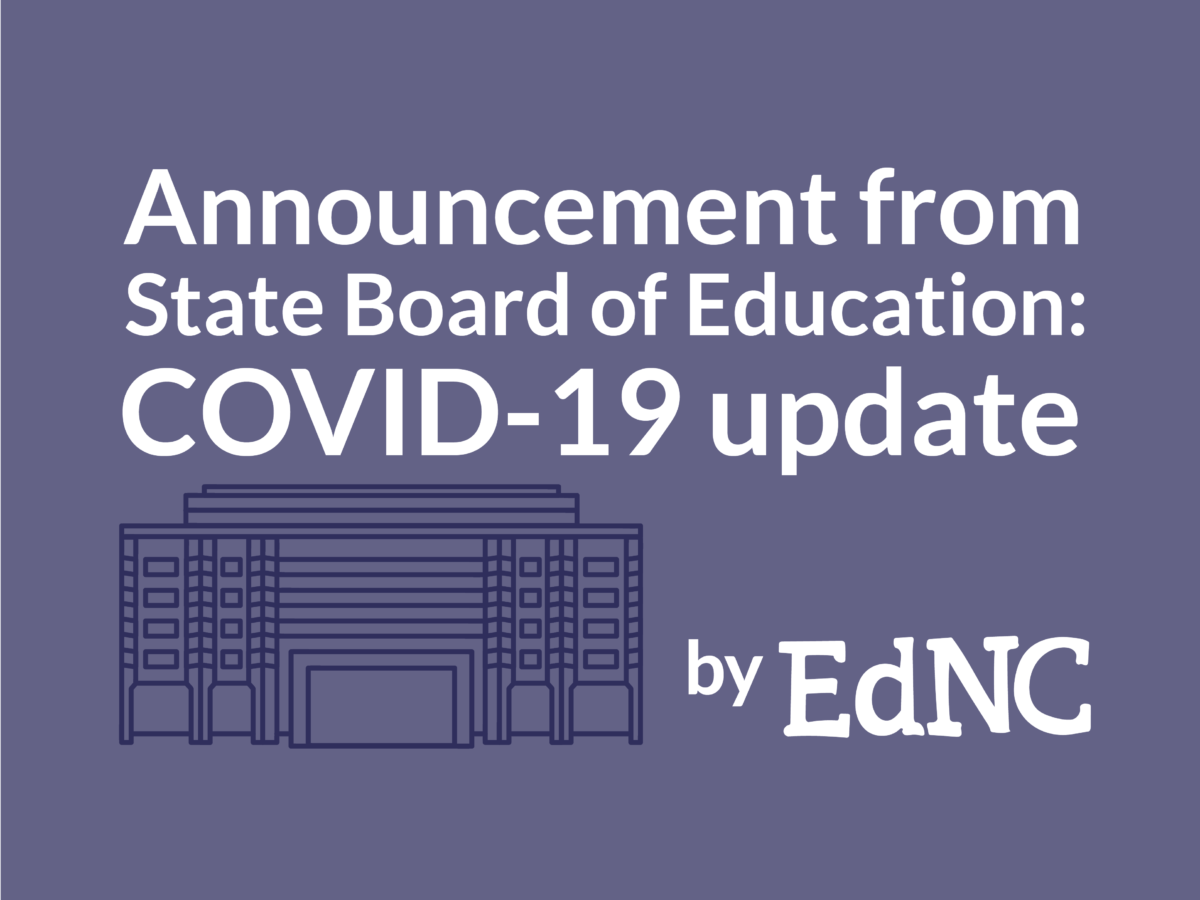

The State Board of Education took up the distribution of federal COVID-19 funds, guidance for district remote learning plans, extension of emergency leave, and more in an emergency meeting on Thursday. State Superintendent of Public Instruction Mark Johnson also announced big news about the K-3 reading diagnostic tool used by schools. Let’s take these one by one.
K-3 reading diagnostic
Johnson announced at the Board meeting that school districts will be able to use whatever K-3 reading diagnostic tool they want next year. This comes after a long period of strife over what diagnostic tool the state should be using.
As part of the Read to Achieve program, a diagnostic tool is necessary to measure the progress of students.
The state Department of Public Instruction (DPI) originally chose Istation to be the state’s tool, replacing mCLASS, a product of the company Amplify, that had been in use in the state’s public schools for years.
The procurement process for that contract became a source of a lot of contention. Amplify — a competitor in the bidding process — took issue with how the procurement process happened. The state Department of Information Technology (DIT) has been reviewing how Istation was chosen and put a stay on the implementation of that contract while the issue was being litigated. DIT has yet to issue a decision.
In April of this year, DPI canceled its three-year contract with Istation and Johnson said a new procurement process would start.
Johnson said that while a statewide reading diagnostic tool will likely be needed in the years ahead, allowing districts to choose their own tool next year would “eliminate uncertainty.”
Johnson said DPI will give districts a list of diagnostic tools they can use for next year.
Distribution of federal aid by State Board
During Thursday’s meeting, the Board also finalized distribution of most of the $396 million in federal aid sent to the state to distribute to school districts and charter schools in response to COVID-19.
Of that money, DPI is required to distribute 90% to districts, with a portion of that held back for allotments to “new or significantly expanded charter schools” next school year. This is the portion voted on today.
The remaining 10% of the total funds can be “used to address emergency needs as determined by the State Board of Education to address issues responding to coronavirus, either through the use of additional grants or through contracts.” The State Board can reserve up to 0.5% of the money for administrative costs.
Here is the finalized allocation to districts.
Here are the restrictions on how the funds can be used.
Distribution of child nutrition funds by State Board
As part of COVID-19 relief legislation passed by the General Assembly earlier this month, lawmakers allocated $75 million in federal aid for child nutrition services for the state’s public schools.
On Thursday, the State Board voted on how to distribute those funds to districts. Below is a document detailing how much of that money districts will get.
The following document includes restrictions on how that money can be used.
Remote learning plan guidance
The Board approved guidelines for remote learning plans for school districts around the state.
As part of that same COVID-19 relief legislation passed by lawmakers earlier this month, school districts are required to come up with plans for delivering remote instruction to students for next school year.
The plans provided by districts must have responses to 13 “components,” including consultation with staff, parents, students, and the community; training for teachers and staff; surveying teacher and student connectivity, and having a plan in place to meet their individual needs; ensuring students with disabilities have equal access to remote instruction; and more. See all the guidelines below.
Districts are required to submit their plans to the State Board of Education by July 20.
State Board member James Ford questioned why reaching out to English language learners wasn’t one of the requirements for districts developing remote learning plans. It is listed as optional, but Ford said it should be required.
In response to discussion following from Ford’s comments, the Board added a requirement of “responding to the needs” of English language learners, academically and/or intellectually gifted learners, and homeless students.
Emergency leave
The State Board revisited its policies on emergency leave, and voted to extend the emergency paid leave through June 15.
The State Board passed an emergency leave policy change in late March that lets districts pay and give benefits to eligible staff who can’t work remotely, have child care or elder care needs, and/or are at high risk for getting COVID-19, among others. The policy change allowed for up to 168 hours of paid emergency leave.
In April, the Board extended emergency paid leave to May 31 and increased the number of hours of paid emergency leave to 328.
The latest revision increases the number of hours of paid emergency leave to 416.
Here is the amended policy.
Support of public school students
In a joint statement Tuesday, the North Carolina Community College System and DPI issued a joint statement of support for the state’s students.
“Many of our graduates had concerns that this crisis could disrupt their next steps,” said Johnson in the statement. “I am proud of our work with the community college system to help students move forward with their education. Community colleges’ open-door admission policies ensure that any student will be eligible, regardless of test scores and grade point averages. Graduates should not let this pandemic disrupt their next steps.”
“Despite the upheaval of the past few months, we want students to know that we will do everything possible to serve them and ensure that their future educational path is a smooth one,” said Peter Hans, president of the NC Community College System, in the statement. “Community colleges are beefing up advising and career services to help students as they navigate their way forward.”
See the entire release here.



